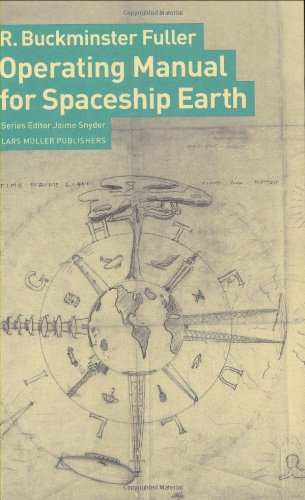R. Buckminster Fuller: Operating Manual for Spaceship Earth (1968)
Filed under book | Tags: · architecture, earth, engineering, sustainability, synergy, systems theory

“In this essay on man Mr. Fuller expresses what may well be his penultimate view of the human condition. Here, in a mood at once philosophical and involved, Mr. Fuller traces man’s intellectual evolution and weighs his capability for survival on this magnificent craft, this Spaceship Earth, this superbly designed sphere of almost negligible dimension in the great vastness of space.”
HTML (from bfi.org, via Internet Archive, updated on 2015-1-16)
EPUB, MOBI (thanks Marcell Mars; updated on 2015-1-16)
Rosalyn Deutsche: Evictions: Art and Spatial Politics (1996)
Filed under book | Tags: · architecture, art, art criticism, public space, space, urban design, urban planning, urbanism

“Since the 1980s a great deal has been written on the relationship between art, architecture, and urban planning and design, on the one hand, and the politics of space on the other. In Evictions Rosalyn Deutsche investigates—and protests against—the dominant uses of this interdisciplinary discourse.
Deutsche argues that critics on both the left and the right invoke harmonious images of space that conceal and justify exclusions—whether the space in question is a city, park, institution, exhibition, identity, or work of art. By contrast, she calls for a democratic spatial critique that takes account of the conflicts that produce and maintain all spaces, including the space of politics itself.
Evictions examines how aesthetic and urban ideologies were combined during the last decade to legitimize urban redevelopment programs that claimed to be beneficial to all, yet in reality tried to expunge traditional working classes from the city. Combining critical aesthetic theory about the social production of art with critical urban theory about the social production of space, Deutsche exposes this unspoken agenda. She then responds to a new alliance of prominent urban and cultural scholars who use critical spatial theory to protect traditional left political projects against the challenges posed by new radical cultural practices.
In her critique, Deutsche mobilizes feminist and postmodern ideas about the politics of visual representation and subjectivity. She also intervenes in debates taking place in art, architecture, and urban studies about the meaning of public space, and places these struggles within broader contests over the definition of democracy. Opposing the nostalgic belief that democracy’s survival demands the recovery of a once unified public sphere, Deutsche contends that conflict, far from undermining public space, is a prerequisite for its existence and growth.”
Publisher MIT Press, Dec 1996
Graham Foundation / MIT Press Series in Contemporary Architectural Discourse
ISBN 0262041588, 9780262041584
xxiv+394 pages
Reviews: Martin Hayes (H-Urban, 1997), Gillian Rose (Env & Planning D: Society & Space, 1997), Gordon Brent Ingram (Fuse, 1997), Christopher Ho (PAJ, 1998).
PDF (updated on 2015-2-19)
Comments (3)Malcolm McCullough: Abstracting Craft: The Practiced Digital Hand (1996)
Filed under book | Tags: · architecture, computer graphics, craft, design, industrial design

The love of making things need not be confined to the physical world —electronic form giving can also be a rewarding hands-on experience. In this investigation of the possibility of craft in the digital realm, Malcolm McCullough observes that the emergence of computation as a medium, rather than just a set of tools, suggests a growing correspondence between digital work and traditional craft.
Personal and conversational in tone, with examples and illustrations drawn from a variety of disciplines, Abstracting Craft shows that anyone who gives form with software, whether in architecture, painting, animating, modeling, simulating, or manufacturing, is practicing personal knowledge and producing visual artifacts that, although not material, are nevertheless products of the hands, eyes, and mind.
Chapter by chapter, McCullough builds a case for upholding humane traits and values during the formative stages of new practices in digital media. He covers the nature of hand-eye coordination; the working context of the image culture; aspects of tool usage and medium appreciation; uses and limitations of symbolic methods; issues in human-computer interaction; geometric constructions and abstract methods in design; the necessity of improvisation; and the personal worth of work.
For those new to computing, McCullough offers an inside view of what the technology is like, what the important technical issues are, and how creative computing fits within a larger intellectual history. Specialists in human-computer interaction will find an interesting case study of the anthropological and psychological issues that matter to designers. Artificial intelligence researchers will be reminded that much activity fails to fit articulable formalisms. Aesthetic theorists will find a curiously developed case of neostructuralism, and cultural critics will be asked to imagine a praxis in which technology no longer represents an authoritarian opposition. Finally, the unheralded legions of digital craftspersons will find a full-blown acknowledgment of their artistry and humanity.
Publisher MIT Press, 1996
Antipode Book Series
ISBN 0262133261, 9780262133265
309 pages
EPUB (updated on 2014-9-14)
Comment (0)
